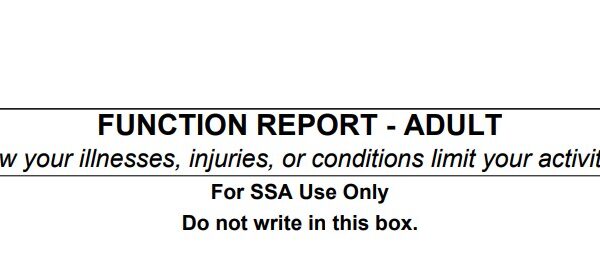When navigating the complexities of the disability benefits application process, claimants may encounter various forms and assessments aimed at evaluating their ability to perform daily activities. One such document is the Adult Function Report, a crucial component that provides the Social Security Administration (SSA) with valuable insights into an individual’s daily life and functioning. In this blog post, we will delve into what an Adult Function Report is, its purpose, and how it impacts the disability claims process.

Understanding the Adult Function Report

The Adult Function Report, also known as Form SSA-3373, is a detailed questionnaire designed to gather information about an individual’s ability to perform various daily activities. This form plays a significant role in helping the SSA assess the extent of a claimant’s functional limitations due to a medical impairment.
Purpose of the Adult Function Report
The main purpose is to give the SSA a comprehensive understanding of how a disability affects an individual’s ability to work and engage in typical daily activities. Claimants are required to provide detailed information about their daily routines, self-care, social interactions, and any challenges they face due to their medical condition.
Key Sections of the Adult Function Report
- Basic Information: Claimants must provide personal details, including their name, address, and contact information.
- Daily Activities: This section requires a detailed account of the claimant’s typical day. It covers activities such as getting dressed, bathing, preparing meals, and performing household chores. Claimants are asked to describe any difficulties they encounter and whether they need assistance.
- Social Functioning: The form asks about a claimant’s ability to interact with others, participate in social activities, and handle stress or changes in routine.
- Concentration and Focus: Claimants are asked about their ability to concentrate, follow instructions, and complete tasks. This section aims to assess cognitive functioning and attention span.
- Physical Limitations: Individuals are prompted to describe any physical limitations they experience, such as difficulty standing, walking, or lifting objects.
- Medication and Treatment: Claimants are asked to provide information about medications, treatments, and any side effects that may impact their daily functioning.
The Impact on Disability Claims
The information gathered through the Adult Function Report is a critical component in the overall evaluation of a disability claim. It helps the SSA understand the practical impact of a medical impairment on a claimant’s ability to perform work-related activities. This data, combined with medical evidence and other assessments, contributes to the SSA’s decision-making process regarding disability benefits eligibility.
The Adult Function Report serves as a vital tool in the disability claims process, providing the SSA with a firsthand account of how a medical impairment affects an individual’s daily life. Completing this form accurately and thoroughly can significantly impact the outcome of a disability claim, making it essential for claimants to approach it with diligence and sincerity. By understanding the purpose and significance of the Adult Function Report, individuals can navigate the claims process more effectively and increase their chances of securing the support they need.

If you need assistance completing an AFR for your disability claim, contact Parmele Law Firm to schedule your no-cost consultation: 866-889-2570. Our team has decades of experience in Social Security disability law and has successfully helped over 55,000 individuals receive the disability benefits they deserve.
Parmele Law Firm. Guiding you with integrity, competency, and experience.
